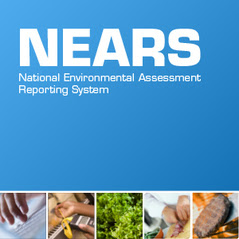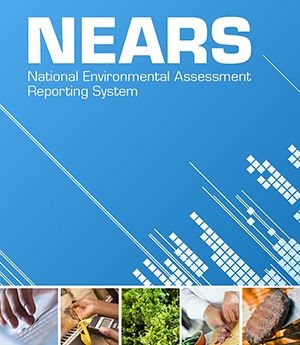Sign up for NEARS: CDC’s National Environmental Assessment Reporting System
 NEARS captures environmental assessment data from foodborne illness outbreak investigations to help prevent outbreaks associated with restaurants and other food venues. If you sign up for NEARS, you can access and use your NEARS data at any time to
|
How Can I Learn More About NEARS?
- Spend an hour getting to know this surveillance system with an on-demand NEARS webinar.
- Explore our summary reports on characteristics of previous outbreaks and the establishments where the outbreaks occurred.
- Check our participant map to see if your jurisdiction is registered.
Learn More
Use CDC’s NEARS surveillance system to capture environmental assessment data from foodborne illness outbreak investigations to improve your food safety programs.

- New to the system? Explore the steps needed to gain access.
- Already an approved NEARS user? Log on.
Participating in NEARS Helps Your Program
Participating in NEARS can help prevent foodborne illness outbreaks associated with restaurants, banquet facilities, schools, and other institutions. Your program can access and use your NEARS data at any time to
- Identify environmental causes of outbreaks in your jurisdiction.
- Take follow-up action to reduce or prevent future foodborne illness outbreaks.
- Evaluate your food safety program and make improvements based on established guidelines.
- Develop or modify program policies or regulations.
- Focus limited program resources on actions with the highest impact.
- Help your program meet the Food and Drug Administration’s Retail Food Program Standards (Standard 5[PDF – 114 KB]).
Participating in NEARS Helps the National Food Safety System
CDC and national food safety partners recommend that all food safety programs use NEARS to improve food safety in the United States. Environmental assessments help identify the underlying environmental causes of foodborne illness outbreaks. By participating in NEARS, your program is providing critical data from these assessments to prevent and reduce future outbreaks. CDC and its national food safety partners will use NEARS to
- Analyze standardized data to understand how and why outbreaks occur.
- Share findings or recommend actions to better respond to outbreaks and prevent future ones.
Regulatory agencies such as the U.S. Food and Drug Administration use information from NEARS to develop intervention strategies and recommended regulations such as the Food Code. Food safety programs use this information during outbreak investigations and on a daily basis for issuing permits and inspecting restaurants and other facilities.
Testimonials
“We are pleased to be part of this venture. Not only does it put us on the map, but it increases our conformance with FDA’s Retail Program Standard 5 — Foodborne Illness and Food Defense Preparedness and Response.”
–Office of Food Protection, Delaware Division of Public Health
“…my first data entry was a pleasantly smooth process. There were no major issues, the online layout is logical, all needed resources are readily available, and the NEARS staff were accessible to answer each of my questions quickly. Our Food Safety Program is excited for the clear and consistently organized format we can use to download our data at the end of the year. NEARS appears to be just the tool we needed.”
–Food Safety Program, Washington State Department of Health
*Note: NEARS was formerly known as National Voluntary Environmental Assessment Information System (NVEAIS).


































No hay comentarios:
Publicar un comentario